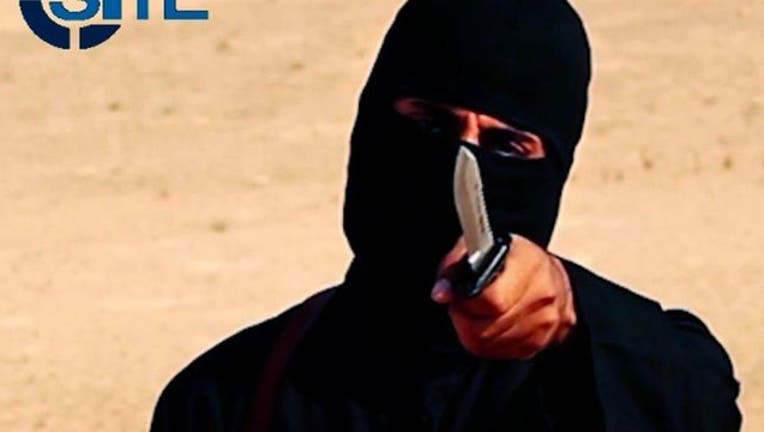ISIS confirms death of 'Jihadi John'

Photo via FoxNews.com
NEW YORK (AP) — The Islamic State group has acknowledged the death of the masked militant known as "Jihadi John," who appeared in several videos depicting the beheadings of Western hostages, in an article in its online English-language magazine Dabiq.
A "eulogizing profile" of Jihadi John appeared in the magazine which was shared online late Tuesday by sympathizers of the Islamic State group. Jihadi John had been identified by the U.S. military as Mohammed Emwazi, a Kuwaiti-born British citizen.
"His harshness towards the kuffar (disbelievers) was manifested through deeds that enraged all the nations, religions, and factions of kufr, the entire world bearing witness to this," said the English-language article which confirmed that Emwazi was killed in a drone strike.
Army Col. Steve Warren, a U.S. military spokesman, said in November that the Army was "reasonably certain" that a drone strike in Syria had killed Emwazi, who spoke in beheading videos with a British accent as he wielded a knife.
Separately, a U.S. official said three drones — two U.S. and one British — targeted the vehicle in which Emwazi was believed to be traveling in Raqqa, the capital of the Islamic State's self-proclaimed caliphate in northern Syria. The official said the U.S. drone fired a Hellfire missile that struck the vehicle.
"Jihadi John" appeared in videos posted online by the Islamic State starting in August 2014 that depicted the beheadings of U.S. journalists Steven Sotloff and James Foley, U.S. aid worker Abdul-Rahman Kassig, British aid workers David Haines and Alan Henning, and Japanese journalist Kenji Goto.
Sotloff's mother, Shirley Sotloff, told The Associated Press on Tuesday that she hadn't heard about the IS announcement but assumed Emwazi was dead following the Army's announcement last fall.
"It's good," she said. "I'm glad that he's gone, but it doesn't bring back my son."
Jodi Perras, a spokeswoman for the Kassig family in Indianapolis, said they had no comment on the news about Jihadi John.
In the gruesome videos, a tall masked figure clad in black and speaking in a British accent typically began with a political rant taunting the West and a kneeling hostage clad in an orange prison-style jumpsuit before him, then ended it holding an oversize knife in his hand with the headless victim lying before him in the sand. The videos don't make clear if he carried out the actual killings.
He also appeared as a narrator in videos of other beheadings, including the mass killing of captive Syrian government soldiers.
Emwazi was believed to be in his mid-20s when he was killed. He had been described by a former hostage as a psychopath who enjoyed threatening his Western captives.
Spanish journalist Javier Espinosa, who was held by the IS in Syria for more than six months after his abduction in September 2013, said Emwazi would explain precisely how the militants would carry out a beheading.
The hostages nicknamed three British-sounding captors "the Beatles," with "Jihadi John" a reference to John Lennon, Espinosa said.
Emwazi was born in Kuwait and spent part of his childhood in the poor Taima area of Jahra before moving to Britain as a boy, according to news reports quoting Syrian activists who knew the family. He attended state schools in London, then studied computer science at the University of Westminster.
The Dabiq article said he became involved in jihadi activity around the time of the 2005 attacks on the London transit system, and came under the scrutiny of the British intelligence agency MI5. It said he arrived in Syria in the latter part of 2012, and was later wounded while fighting with Islamic State forces in Syria.
Dabiq claimed that Emwazi displayed his "kindness and generosity" by giving away a concubine he had received as a gift to an unmarried injured IS fighter.
The eulogy appeared in the 13th issue of Dabiq magazine, named for a town in northern Syria that Islamic State fighters believe will be the site of an apocalyptic battle between it and Western forces. The magazine contains articles, interviews and opinion pieces about the group. Distributed online as a .pdf file, it has a professional layout, including photos and graphics, giving it the appearance of a glossy magazine.
The online magazine is part of a media operation that has produced scores of graphic, professionally produced videos of military operations and the killing of captives in Iraq, Syria and other countries like Libya and Afghanistan, where the IS group has local affiliates and supporters. Emwazi figured heavily into that propaganda.
___
Associated Press writers Charles J. Gans in New York and Dave Fischer in Miami contributed to this report.

